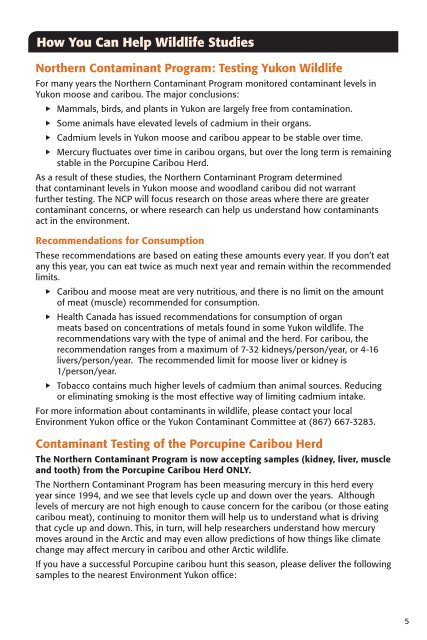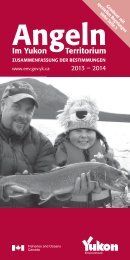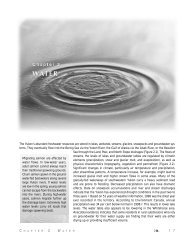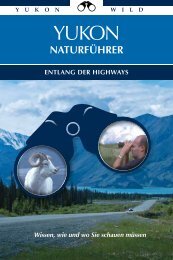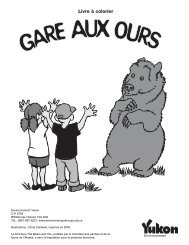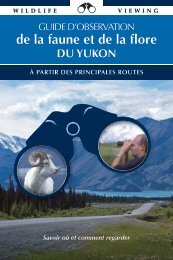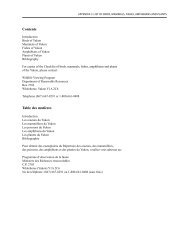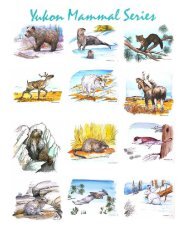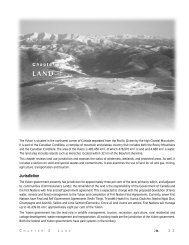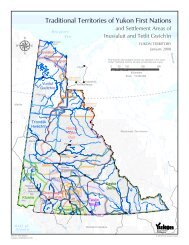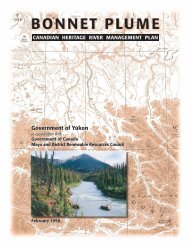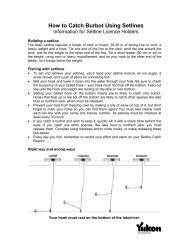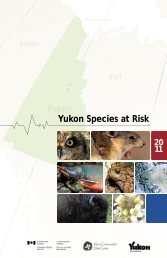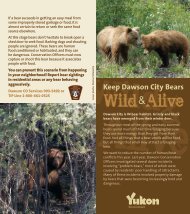Yukon Hunting - Department of Environment - Government of Yukon
Yukon Hunting - Department of Environment - Government of Yukon
Yukon Hunting - Department of Environment - Government of Yukon
You also want an ePaper? Increase the reach of your titles
YUMPU automatically turns print PDFs into web optimized ePapers that Google loves.
How You Can Help Wildlife Studies<br />
Northern Contaminant Program: Testing <strong>Yukon</strong> Wildlife<br />
For many years the Northern Contaminant Program monitored contaminant levels in<br />
<strong>Yukon</strong> moose and caribou. The major conclusions:<br />
u Mammals, birds, and plants in <strong>Yukon</strong> are largely free from contamination.<br />
u Some animals have elevated levels <strong>of</strong> cadmium in their organs.<br />
u Cadmium levels in <strong>Yukon</strong> moose and caribou appear to be stable over time.<br />
u Mercury fluctuates over time in caribou organs, but over the long term is remaining<br />
stable in the Porcupine Caribou Herd.<br />
As a result <strong>of</strong> these studies, the Northern Contaminant Program determined<br />
that contaminant levels in <strong>Yukon</strong> moose and woodland caribou did not warrant<br />
further testing. The NCP will focus research on those areas where there are greater<br />
contaminant concerns, or where research can help us understand how contaminants<br />
act in the environment.<br />
Recommendations for Consumption<br />
These recommendations are based on eating these amounts every year. If you don’t eat<br />
any this year, you can eat twice as much next year and remain within the recommended<br />
limits.<br />
u Caribou and moose meat are very nutritious, and there is no limit on the amount<br />
<strong>of</strong> meat (muscle) recommended for consumption.<br />
u Health Canada has issued recommendations for consumption <strong>of</strong> organ<br />
meats based on concentrations <strong>of</strong> metals found in some <strong>Yukon</strong> wildlife. The<br />
recommendations vary with the type <strong>of</strong> animal and the herd. For caribou, the<br />
recommendation ranges from a maximum <strong>of</strong> 7-32 kidneys/person/year, or 4-16<br />
livers/person/year. The recommended limit for moose liver or kidney is<br />
1/person/year.<br />
u Tobacco contains much higher levels <strong>of</strong> cadmium than animal sources. Reducing<br />
or eliminating smoking is the most effective way <strong>of</strong> limiting cadmium intake.<br />
For more information about contaminants in wildlife, please contact your local<br />
<strong>Environment</strong> <strong>Yukon</strong> <strong>of</strong>fice or the <strong>Yukon</strong> Contaminant Committee at (867) 667-3283.<br />
Contaminant Testing <strong>of</strong> the Porcupine Caribou Herd<br />
The Northern Contaminant Program is now accepting samples (kidney, liver, muscle<br />
and tooth) from the Porcupine Caribou Herd ONLY.<br />
The Northern Contaminant Program has been measuring mercury in this herd every<br />
year since 1994, and we see that levels cycle up and down over the years. Although<br />
levels <strong>of</strong> mercury are not high enough to cause concern for the caribou (or those eating<br />
caribou meat), continuing to monitor them will help us to understand what is driving<br />
that cycle up and down. This, in turn, will help researchers understand how mercury<br />
moves around in the Arctic and may even allow predictions <strong>of</strong> how things like climate<br />
change may affect mercury in caribou and other Arctic wildlife.<br />
If you have a successful Porcupine caribou hunt this season, please deliver the following<br />
samples to the nearest <strong>Environment</strong> <strong>Yukon</strong> <strong>of</strong>fice:<br />
5


